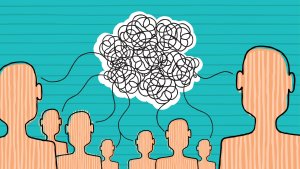Connecting with people is about more than getting on. It improves your performance, work and health.
Your Personal Ecosystem: What Is It And How Can You Take Advantage?
Connecting with people is about more than getting on. It improves your performance, work and health.

What’s your #1 personal asset? Your skills? Your job? Your ambition? Your looks? Your mind? None of the above. Your greatest asset is your personal ecosystem. Who we know and how we connect to people in our personal ecosystems provide the strongest foundations and advantages in life and business.
To help you think big, you need to create a perpetual motion machine of ideas, energy, and relationships to achieve your goals. You can only do this with a high-functioning personal ecosystem. Our sharing economy, powered by technology, is connecting people all over the world.
Those who have personal influence power to make things happen – the networkers and collaborators – are the ones who will get ahead.
As humans, we need to mirror our technology: To act fast, get connected, and think like a network. Today, what is valuable is our social currency, our earned influence.
People with social currency establish trusted relationships that allow them to move faster and be more effective. How can you acquire more social currency? We suggest you leverage your personal ecosystem.
Mother Nature teaches us that everything in the physical world is connected and interdependent. A personal ecosystem is connected too, and comprises your personal brand, your positive relationships, and your networks. How these elements weave through your life creates your unique footprint.
BRAND “YOU”
Think of yourself, your reputation, as a brand, like Coca-Cola, Land’s End, or Nike. Each has specific attributes and conjures up unique emotions when interacting with its customers and communities. The same is true for you.
We are all entrepreneurs, leading the brand of “You” – complete with our personal values and career aspirations, intellectual and emotional assets, and unique market differentiators. The key is to manage your career as if it were a start-up business. Like entrepreneurs, we must invest in ourselves and take our product to market.
People are sensitive social creatures. We respect those who try to connect authentically. Being yourself in public will help accomplish that. An easy smile, a quick one-liner, or a ready compliment seems automatic and natural, creating rapport and connection.
But for many of us, we struggle to build confident rapport with those around us. We need to put in effort to show our genuine selves. Creating your brand “You” requires self-awareness, commitment, and humility. On the flip side, you also need to know how to brag.
There is an acceptable form of boasting. It’s called “bragging rights.” We give people permission to brag about real accomplishments. We often see it on social media sites, like LinkedIn. People use their “bragging rights” as a form of personal advertising.
Great self-promoters understand personal marketing. It’s not hubris, overconfidence, or arrogance. It’s smart self-promotion. People like working with and for successful people. But it’s got to be honest and real. Nobody likes somebody who is always trying to impress you or tries to deceive you.
That’s why confident humility is so important. We tend to equate confidence with competence. But that is not always the case. Confident people are good at hiding their insecurities and incompetence.
Their extroverted, charismatic demeanor can fool you. That’s where humility comes in. It is a good reality check and when expressed publicly can be a real relationship enhancer.
When you view yourself as a brand, you’re able to see opportunities to grow your personal ecosystem. It could be something as simple as finding a signature way to introduce yourself to new people.
When asked, “What do you do?” you might talk about who you are. Saying, “I move people” is a thousand times more intriguing than saying, “I’m a bus driver.”
A short, provocative statement almost always gets the listener to explore more about you. And that’s the point. The more you share about yourself and your business, the wider you can stretch your personal ecosystem.
IT’S ABOUT YOUR RELATIONSHIPS
We are biologically programmed to form social bonds and connect in deep, personal ways. No one is an island of self-interest. We are all part of the web of interconnectedness. Our mirror neurons are the intercommunicators in our brain, while our relationships are like social electricity.
Your smile energizes others. Your anxiety makes people nervous. You bring the argument with your spouse at breakfast to the performance appraisal you conduct in the morning. The loss of a big client goes home with you and disrupts the family dinner.
Here’s how it works: The healthier relationships are, the more information is shared. The more information is shared, the more people feel connected. The more people feel connected, the more they trust each other.
The more trust people feel, the more interconnected and interdependent they will want to become. Having strong, trusted relationships with a wide range of people nourishes your personal ecosystem.
It is also important to your health. In a cover story of the Harvard Business Review, Dr. Vivek Murthy, US surgeon general, spoke out about the “loneliness epidemic” pervading our workplaces. It’s affecting people of all ages and backgrounds and happening at a time when work has become our primary social network.
Warns Murthy, “We live in the most technologically connected age in the history of civilization, yet the rates of loneliness have doubled since the 1980s”. Loneliness is associated with greater risk of heart disease, anxiety, and depression.
It reduces performance, limits creativity, and impairs decision making. Yet if you have strong connections with people at work, your performance improves and so does your health.
This is an edited extract from Conscious: The Power of Awareness in Business and Life, by Bob Rosen and Emma-Kate Swann (Wiley, August 2018).
About the authors
Bob Rosen is the founder and CEO of Healthy Companies International, where co-author Emma-Kate Swann serves as vice president of leadership and transformation. As an organizational psychologist, Rosen is a trusted global CEO advisor and bestselling author of several books including the New York Times bestseller Grounded).
He helps top executives achieve their leadership potential and build healthy, high-performing, and sustainable companies. Bob is a frequent media commentator and has been quoted in The New York Times, The Wall Street Journal, Fortune, Bloomberg Businessweek, Financial Times, among others.
Thanks for signing up to Minutehack alerts.
Brilliant editorials heading your way soon.
Okay, Thanks!

